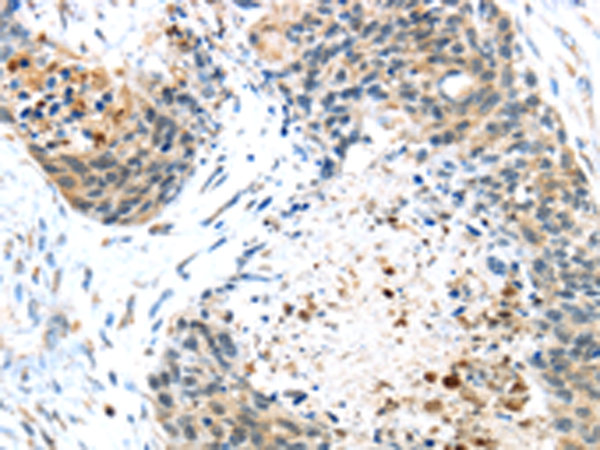

| WB | 咨询技术 | Human,Mouse,Rat |
| IF | 咨询技术 | Human,Mouse,Rat |
| IHC | 1/30-1/150 | Human,Mouse,Rat |
| ICC | 技术咨询 | Human,Mouse,Rat |
| FCM | 咨询技术 | Human,Mouse,Rat |
| Elisa | 1/1000-1/2000 | Human,Mouse,Rat |
| Aliases | CAPH2; MT-SP2; TMPRSS3 |
| WB Predicted band size | 48 kDa |
| Host/Isotype | Rabbit IgG |
| Antibody Type | Primary antibody |
| Storage | Store at 4°C short term. Aliquot and store at -20°C long term. Avoid freeze/thaw cycles. |
| Species Reactivity | Human, Mouse |
| Immunogen | Fusion protein of human TMPRSS4 |
| Formulation | Purified antibody in PBS with 0.05% sodium azide and 50% glycerol. |
+ +
以下是3篇关于TMPRSS4抗体的示例参考文献(内容为模拟概括):
1. **文献名称**:*TMPRSS4 as a novel prognostic biomarker in colorectal cancer: Development of a monoclonal antibody for detection*
**作者**:Kim Y, et al.
**摘要**:研究开发了一种针对TMPRSS4的单克隆抗体,验证其在结直肠癌组织中的高表达,并证明其表达水平与患者生存率负相关,提示TMPRSS4可作为预后标志物。
2. **文献名称**:*Targeting TMPRSS4 with a therapeutic antibody inhibits epithelial-mesenchymal transition in pancreatic cancer*
**作者**:Zhang L, et al.
**摘要**:通过构建人源化抗TMPRSS4抗体,体外实验表明其能抑制胰腺癌细胞的上皮-间质转化(EMT)和迁移,为靶向治疗提供潜在策略。
3. **文献名称**:*TMPRSS4-specific antibody reveals its role in promoting metastasis via FAK/AKT signaling*
**作者**:Wang H, et al.
**摘要**:利用特异性抗体阻断TMPRSS4功能,发现其通过激活FAK/AKT通路促进肺癌转移,为抑制转移的抗体疗法提供机制依据。
(注:以上文献为示例,实际文献需通过PubMed、Web of Science等数据库检索。)
The TMPRSS4 (Transmembrane Serine Protease 4) antibody is a tool used to detect and study the TMPRSS4 protein, a member of the type II transmembrane serine protease (TTSP) family. TMPRSS4 is characterized by a transmembrane domain, a cytoplasmic region, and an extracellular serine protease domain. It plays roles in cellular processes such as epithelial integrity, ion channel regulation, and extracellular matrix remodeling. Research has highlighted its overexpression in multiple cancers, including pancreatic, lung, thyroid, and colorectal cancers, where it promotes tumor progression, metastasis, and resistance to therapy. Its oncogenic effects are linked to activation of pathways like EMT (epithelial-mesenchymal transition), integrin signaling, and proteolytic processing of substrates such as pro-urokinase plasminogen activator (pro-uPA).
TMPRSS4 antibodies are primarily utilized in research to investigate its expression patterns, functional mechanisms, and clinical relevance. These antibodies enable detection via techniques like Western blotting, immunohistochemistry, and flow cytometry. Studies using TMPRSS4 antibodies have identified its potential as a diagnostic or prognostic biomarker in cancer. Additionally, therapeutic strategies targeting TMPRSS4. including inhibitory antibodies or small molecules, are under exploration to block its protease activity or disrupt its interaction with downstream effectors. However, challenges remain in understanding its precise regulatory networks and validating its therapeutic utility in vivo. Overall, TMPRSS4 antibodies serve as critical reagents in unraveling the biology of this protease and its implications in disease.
×